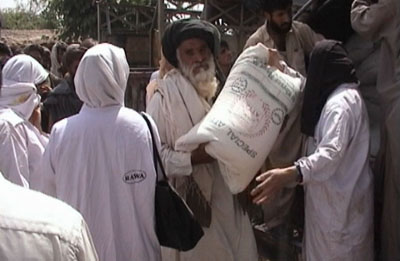PESHAWAR: Scores of starving Afghan refugees were baton-charged, Thursday by their fellow countrymen when they gate crashed to get wheat flour being distributed by Revolutionary Association of the Women of Afghanistan (RAWA).
Men were violently beaten up with sticks, women and young girls pushed and dragged out of the area commander's office at Jalozai refugee camp, around 25 kilometer from here.
The charged and tens atmosphere forced the other refugees waiting outside the office to dash in. On seeing them enter the gate, the security staff and the insiders sprang towards them to stop them and scuffles broke out between them. Both the sides freely used their sticks, blows and bricks and looked for things they could use as weapons.
They hurled abuses at each other. It was a free for all. The security staff made a gigantic effort to tame the mob. They waved their guns in the air to intimidate them and managed to calm them down.
Lamenting the unfortunate incident, Lema Hamidi, a RAWA member, told the Statesmen that following a survey conducted by RAWA, they had themselves invited the women badly beaten with "chadars woven and twisted into ropes" by the Afghans controlling the crowd inside the office, to receive their atta share. She said the association didn't have any complaints against the commander's office staff.
Lal Mohammad, an Afghan elder, said most of those gathered inside were professionals and repeatedly receiving aid they did not deserve at all.
The aid should have gone to those waiting outside as they are starving, " he said in a faint voice.
RAWA had brought 500 atta bags weighing 10 tons to distribute among the refugees. One bag contained 20 Kilos of atta. There are 14,000 families living at the Jalozai camp under inhuman conditions.
Kifayetollah, a refugee, accused the commander's office staff of being involved in irregularities. Because of them, genuine new arrived don't get their food share and the fight was the result of that injustice".
A security official said it was pretty hard to distribute aid among women as they always created problems. He said they always advised aid-distributors to dole out the staff to males.
Earlier, Allahdad Dorrani, area incharge, Jalozai refugee camp, said the recent rain affected around 4,000 families who were later shifted to nearby mosque. He said summer was fast approaching and an outbreak of fatal diseases including those of the skin could not be ruled out.
Potable water would be another major problem as in summer people consumed more water than in any other season, he said. He added at present they were supplying seven tankers of water but in summer they would need much more than that. That's quite difficult to manage because there are not tube-wells around," he said.
